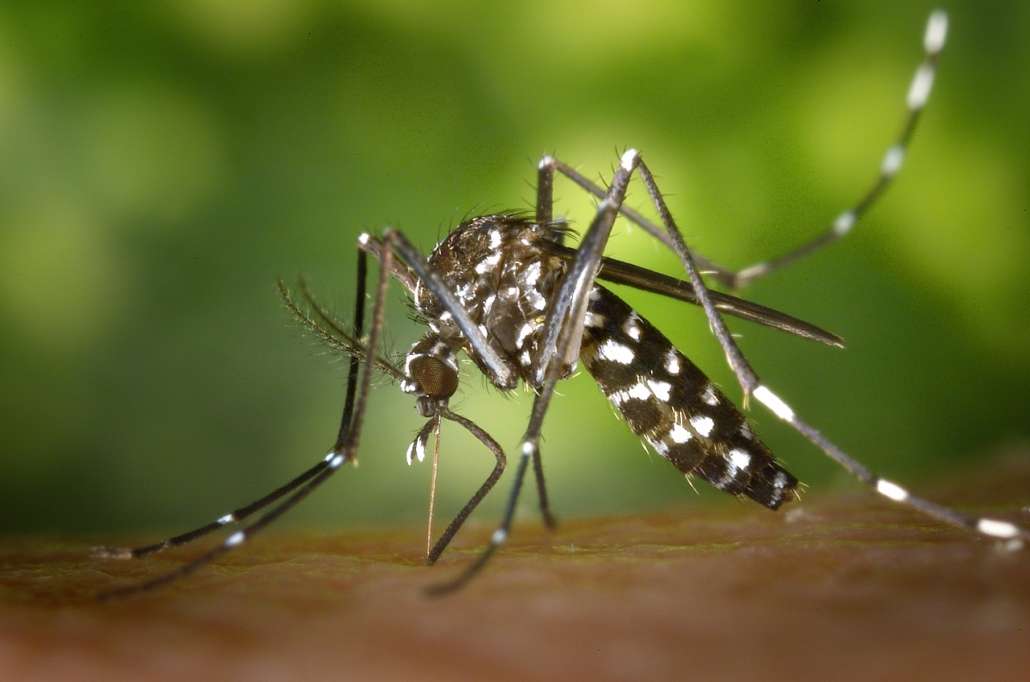SCORES & OUTDOORS: Expert warns Mainers to be vigilant of disease-spreading insect when traveling
 by Roland D. Hallee
by Roland D. Hallee
OK, get ready for another invasion from Asia. This time, it’s a mosquito. Plain and simple, it’s called the Asian tiger mosquito. The mosquito can transmit a number of diseases, including the dengue fever, chikungunya, and Zika virus.
Mainers are encouraged to use repellent if they travel interstate.
Zachary Smith, a licensed pest control professional from PestDude.com, has warned Mainers to be highly vigilant as the Asian tiger mosquito, a small, dark mosquito with distinctive white stripes on its legs and body, spreads across the country at an alarming pace.
One of the key characteristics that makes the Asian tiger mosquito a concern is its ability to serve as a disease vector and transmit a number of diseases, including dengue fever, chikungunya, and Zika virus. While these diseases are not yet widespread in the US, the spread of the Asian tiger mosquito has raised concerns they could become more common in the future. According to Smith, two factors are accelerating the insect’s spread: climate change and human transportation. While little can be done in the short-term about changing weather patterns, there are actions Americans can take to stem its spread:
One of the most effective ways to prevent the spread of the Asian tiger mosquito is to eliminate standing water around homes and businesses. The mosquito lays its eggs in standing water, so removing sources of standing water, such as flower pots, buckets, and old tires, can significantly reduce the mosquito population. Smith also points out that these types of mosquitoes only need a bottle cap full of water to lay their eggs, and these eggs can sometimes survive being dried out. He adds: “Asian tiger mosquitos are quite lazy travelers. So if you’re getting bit, it most likely means you are close to the water source. So look carefully in your vicinity for those hidden spots that are holding water. It can be less obvious than you think – a soda can, an old glass bottle, garbage can lids, a tarp piled on the ground, all those things can hold enough water”.
Another effective strategy is to use mosquito repellents containing DEET, picaridin, or oil of lemon eucalyptus. The mosquito is known to hitchhike on goods and materials that are transported across borders, allowing it to rapidly expand its range. Therefore, people who are traveling interstate, particularly from east to west, are encouraged to wear repellent before setting off on their journey.
Also, it is important to support community-wide efforts to control the mosquito population. This can include initiatives such as mosquito trapping and surveillance programs, public education campaigns, and mosquito control measures such as larviciding and adulticiding.
About the Asian tiger mosquito: It is a highly adaptable species that can survive in a wide range of environments, from urban to rural areas, and from temperate to tropical climates. Unlike many other mosquito species, the Asian tiger mosquito is active during the day, with peak biting activity occurring in the early morning and late afternoon. The mosquito is particularly prevalent in southeastern states, where it has become established in both urban and rural areas.
“We have noticed a huge surge in calls to deal with Asian tiger mosquitos. Pest industry conferences have recently highlighted the invasive species, and colleagues nationwide are reporting similar findings. Despite the detection of the first Asian tiger mosquito in Texas in 1985, its rapid spread has been limited until now. As a result, individuals, especially those traveling between states, are advised to use repellent, while those with yards are encouraged to eliminate standing water to help control the mosquito’s proliferation,” says PestDude.com’s Mr. Smith.
Roland’s trivia question of the week:
Who is the winningest left handed pitcher in Boston Red Sox history?
Responsible journalism is hard work!
It is also expensive!
If you enjoy reading The Town Line and the good news we bring you each week, would you consider a donation to help us continue the work we’re doing?
The Town Line is a 501(c)(3) nonprofit private foundation, and all donations are tax deductible under the Internal Revenue Service code.
To help, please visit our online donation page or mail a check payable to The Town Line, PO Box 89, South China, ME 04358. Your contribution is appreciated!



Leave a Reply
Want to join the discussion?Feel free to contribute!